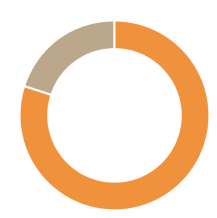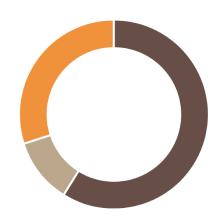GoodShape's New Year of Work - Our Predictions for 2022
Our experts share their informed opinions on the trends that will characterise the world of work in 2022.
%20(resized).webp?width=1134&height=109&name=2022%20predictions%20dividers%20NHS%20(1)%20(resized).webp) Mental health issues among NHS staff will continue to rise
Mental health issues among NHS staff will continue to rise
“Mental health will continue to be a dominant and increasing reason for absence in 2022 within the NHS. In 2021, healthcare staff took an average of 18.6 days off work for each mental-health related absence. This has a huge impact on the service. The pressures on the NHS look set to continue, with a ‘perfect storm’ of Omicron, winter flu season, the rollout of booster jabs, the backlog of elective care, and the advent of Integrated Care Systems coming in the new year. Leaders need to find a balance where staff are supported now to avoid worse repercussions down the line.
“Staffing levels will continue to be a huge pinch point throughout 2022 with the chronic shortage of clinicians continuing, and some say a staff exodus to follow the worst of the pandemic. Reducing spend on temporary staffing to plug the gaps is a key objective, but for leaders who lack insight into staffing trends across their organisation, effective planning will remain a challenge.
“Productivity is inextricably linked to employee wellbeing. The NHS needs to act urgently to adjust internal policies and wellbeing practices to focus on employee health and wellbeing and stem the rising tide of mental ill health. The good news is Integrated Care Systems offer an unprecedented opportunity for the NHS to do this by sharing data and resources regionally.”
Suzanne Marshall, Clinical Governance Officer
.webp?width=1296&height=125&name=2022%20predictions%20dividers%20ICS%20(1).webp) ICSs and budget sharing – will it even be possible?
ICSs and budget sharing – will it even be possible?
“There’s been much talk about pooled budgets and joint commissioning between the NHS and local councils. Yet there are big barriers which may prevent such a radical move. Arguably, there is a danger this approach would undermine and unpick Integrated Care Systems (ICSs) before they have started as they would have to unbundle and share their budgets. To complicate matters further, some ICSs do not neatly match local authority geographies so sharing budget across those boundaries could become very complicated and may even force more boundary changes.
"With winter pressures on the NHS, the ongoing battle with COVID, 90,000 plus vacancies in the NHS and around 112,000 vacancies in the adult social care sector, 2022 will be a challenging year full of change for the public sector. Yet if the opportunity presented by ICSs is embraced by all, and data and resources are shared regionally, the wider public sector could benefit across the board: from improved budgets, insights into staff wellbeing, and better services provided to people in communities."
Stephen May, CRO, GoodShape
 Managing menopause is a challenge all leaders must rise to
Managing menopause is a challenge all leaders must rise to
“As with mental health in the workplace, the menopause is becoming less of a taboo subject but much more needs to be done to communicate the impact it can have on females at work. Not enough employers are aware of the issues and symptoms it can cause such as anxiety, hot flushes, brain fog, heart palpitations, and loss of confidence.
“Currently, many women upon reaching the menopause will make the decision to leave or reduce their role, as they feel they are unable to manage their symptoms at work. Employers must take action and adapt workplace arrangements to help their female colleagues and stop the early drain on talent. Open minds, conversations, support and flexibility to ensure experienced individuals are not lost is critical, with education and communication being key. But this cannot be a conversation led by women for women. It is a topic all leaders must rise to.”
Suzanne Marshall, Clinical Governance Officer
 Employers who focus on prevention rather than cure will get ahead
Employers who focus on prevention rather than cure will get ahead
“Social accountability in ESG (Environmental, Social and Governance) reporting will gather pace in 2022. The pandemic quickly put employee wellbeing at the centre of social change initiatives in 2021. But many missed a beat, failing to accurately report against their initiatives. This will be course-corrected, as many corporations realise the importance of rigour in understanding staff wellbeing.
“2022 will be the year that we begin to see business leaders take a more holistic approach to company health. Organisations are increasingly applying technology and data to help evaluate productivity, and employee wellbeing is an integral part. Now is the time to understand the issues affecting your workforce at all levels – organisational, departmental, individual – for the benefit of employee health, and the health of the business.
“Companies are seeing that more accurate data gives leaders better visibility, so they can target issues and plug gaps. If leaders can act proactively to see where help is needed the most, then they can offer the right support, in the right place at the right time. Staff absence and staff turnover are important indicators of company health, and better data insights will be key to improving such metrics over the next few years.”
Alun Baker, CEO
Smart leaders will reassess their approach to employee benefits
“The pandemic has put wellbeing in the workplace truly on the map. Employers have attempted to improve employee wellbeing for decades, but many of the services offered to staff have either been ignored or have a low take up.
“Traditional services such as Employee Assistance Programmes (EAP) and Occupational Health (OH) generally have a one to ten percent take-up. Such take-up will fail to meet the social ESG aspirations of many boardrooms.
“As we move into a new workplace era, companies need a joined-up approach to wellbeing. Targeted and coordinated initiatives, with managed targets and outcomes are crucial to moving the needle. Without this, leaders will question the effectiveness of the wellbeing support services they’re paying for. And look for solutions that engage and drive better results in terms of employee health, staff retention and a healthy company culture.”
Alun Baker, CEO
Mental health first aiders will become the new norm
“The pandemic has highlighted that line managers are rarely qualified to assess employees’ medical conditions, which increases risk. Against a backdrop of rising mental health-related illnesses, we will see a movement towards more employers providing professional medical support for workers who need advice or absence, and mental health first aiders within the workforce, trained to spot the early signs in people who are suffering."
Suzanne Marshall, Clinical Governance Officer
“We have been using the GoodShape service since 2007”

Lorem ipsum dolor
sit amet, consectetuer
adipiscing.

Lorem ipsum dolor
sit amet, consectetuer
adipiscing.
Find out how we can help.
Fill out the form below and one of our team will be in touch to arrange a meeting.





